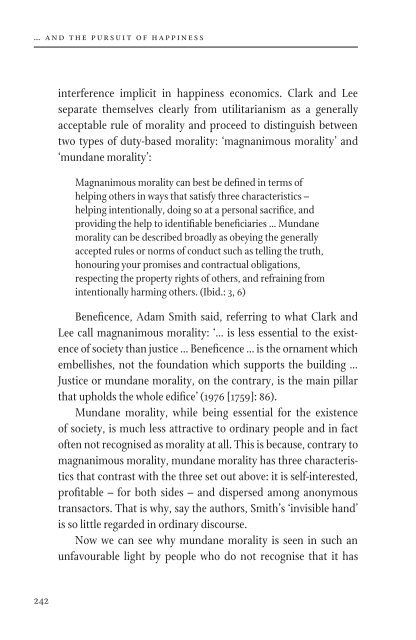… and the Pursuit of Happiness - Institute of Economic Affairs
… and the Pursuit of Happiness - Institute of Economic Affairs
… and the Pursuit of Happiness - Institute of Economic Affairs
Create successful ePaper yourself
Turn your PDF publications into a flip-book with our unique Google optimized e-Paper software.
<strong>…</strong> <strong>and</strong> <strong>the</strong> pursuit <strong>of</strong> happiness<br />
happiness is not within <strong>the</strong> government’s remit<br />
interference implicit in happiness economics. Clark <strong>and</strong> Lee<br />
separate <strong>the</strong>mselves clearly from utilitarianism as a generally<br />
acceptable rule <strong>of</strong> morality <strong>and</strong> proceed to distinguish between<br />
two types <strong>of</strong> duty-based morality: ‘magnanimous morality’ <strong>and</strong><br />
‘mundane morality’:<br />
Magnanimous morality can best be defined in terms <strong>of</strong><br />
helping o<strong>the</strong>rs in ways that satisfy three characteristics –<br />
helping intentionally, doing so at a personal sacrifice, <strong>and</strong><br />
providing <strong>the</strong> help to identifiable beneficiaries <strong>…</strong> Mundane<br />
morality can be described broadly as obeying <strong>the</strong> generally<br />
accepted rules or norms <strong>of</strong> conduct such as telling <strong>the</strong> truth,<br />
honouring your promises <strong>and</strong> contractual obligations,<br />
respecting <strong>the</strong> property rights <strong>of</strong> o<strong>the</strong>rs, <strong>and</strong> refraining from<br />
intentionally harming o<strong>the</strong>rs. (Ibid.: 3, 6)<br />
Beneficence, Adam Smith said, referring to what Clark <strong>and</strong><br />
Lee call magnanimous morality: ‘<strong>…</strong> is less essential to <strong>the</strong> existence<br />
<strong>of</strong> society than justice <strong>…</strong> Beneficence <strong>…</strong> is <strong>the</strong> ornament which<br />
embellishes, not <strong>the</strong> foundation which supports <strong>the</strong> building <strong>…</strong><br />
Justice or mundane morality, on <strong>the</strong> contrary, is <strong>the</strong> main pillar<br />
that upholds <strong>the</strong> whole edifice’ (1976 [1759]: 86).<br />
Mundane morality, while being essential for <strong>the</strong> existence<br />
<strong>of</strong> society, is much less attractive to ordinary people <strong>and</strong> in fact<br />
<strong>of</strong>ten not recognised as morality at all. This is because, contrary to<br />
magnanimous morality, mundane morality has three characteristics<br />
that contrast with <strong>the</strong> three set out above: it is self-interested,<br />
pr<strong>of</strong>itable – for both sides – <strong>and</strong> dispersed among anonymous<br />
transactors. That is why, say <strong>the</strong> authors, Smith’s ‘invisible h<strong>and</strong>’<br />
is so little regarded in ordinary discourse.<br />
Now we can see why mundane morality is seen in such an<br />
unfavourable light by people who do not recognise that it has<br />
much more general <strong>and</strong> beneficent effects in society than personal<br />
magnanimity. Thus, it shocks people to hear that Bill Gates or<br />
Warren Buffet have done much more good in business than with<br />
<strong>the</strong>ir charitable endeavours. In sum: ‘it is much easier to underst<strong>and</strong><br />
<strong>the</strong> persistent criticism <strong>of</strong> markets, <strong>and</strong> <strong>of</strong> <strong>the</strong> invisible h<strong>and</strong><br />
justification for <strong>the</strong>m, once <strong>the</strong> strong emotional attachment to<br />
magnanimous morality is considered’ (Clark <strong>and</strong> Lee, 2011: 7–8).<br />
The inevitable moral conflict at <strong>the</strong> heart <strong>of</strong> a free society<br />
I will conclude this philosophical criticism <strong>of</strong> happiness economics<br />
with a warning against <strong>the</strong> mistake <strong>of</strong> applying magnanimous<br />
moral rules to <strong>the</strong> functioning <strong>of</strong> <strong>the</strong> economic market. An ethical<br />
monism based on natural morality creates confusion in <strong>the</strong><br />
judgement <strong>of</strong> well-meaning people about <strong>the</strong> character <strong>of</strong> transactions<br />
in <strong>the</strong> economic market, where ‘non-tuism’ mostly rules,<br />
thus endangering liberty <strong>and</strong> interfering with capitalist progress.<br />
Conversely, ethical monism is not permissible when trying to<br />
apply free market ethics to personal intercourse. Clark <strong>and</strong> Lee<br />
aptly quote Hayek (1988: 18) on this point:<br />
If we were to apply <strong>the</strong> unmodified, uncurbed, rules <strong>of</strong> <strong>the</strong><br />
micro-cosmos (i.e., <strong>of</strong> <strong>the</strong> small b<strong>and</strong> or troop, or <strong>of</strong> say, our<br />
families) to <strong>the</strong> macro-cosmos (our wider civilization), as our<br />
instincts <strong>and</strong> sentimental yearnings, <strong>of</strong>ten make us wish to do,<br />
we would destroy it. Yet, if we were always to apply <strong>the</strong> rules <strong>of</strong> <strong>the</strong><br />
extended order to our more intimate groupings, we would crush<br />
<strong>the</strong>m. So we must learn to live in two sorts <strong>of</strong> worlds at once.<br />
<strong>Happiness</strong> economics, which tries to extend a deficient<br />
hedonic morality to <strong>the</strong> arrangements <strong>of</strong> an open society, must be<br />
pronounced an unworkable project.<br />
242 243












